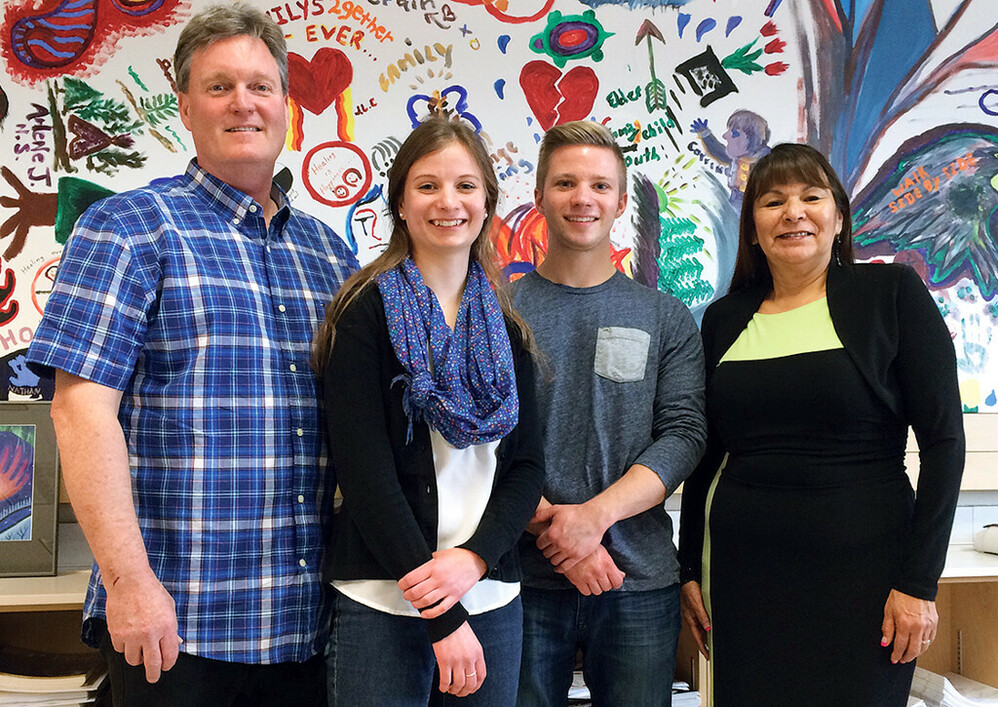Solutions to gender-based violence found in Indigenous knowledge and values

Healing comes through an authentic expression of oneself and their relationship to traditions and community.
That’s the approach the Indigenous-led Creating Hope Society of Alberta and Dr. David Long, professor of sociology at King’s, are taking on a community-based participatory initiative exploring supports available to Indigenous women, girls, and 2SLGBTQ+ persons who have experienced gender-based violence (GBV).
Their project, titled "Remembering Right Relations" (RRR), is years in the making but has recently picked up steam thanks to a grant of $500,000 from the Canadian Institutes of Health Research which will allow the team to advance next stages of the project.
The first phase of RRR involved interviews with GBV support organizations, meetings with elders and, most importantly, sharing circles with survivors to understand how available supports were being experienced. They discovered that Indigenous supports for women and girls who had experienced GBV were few and far between. Indigenous supports for gender-diverse individuals were virtually non-existent.
It was uncovered that what was needed most of all—and what simply did not exist—was a sense of Indigenous community and support for those that experienced GBV. Survivors needed access to elders and cultural programming; land-based activities, traditional gatherings and ceremonies; being out on the land, being together.
The team has a clear idea of where their work needs to go next.
The idea is to develop and test a series of interventions that will include culture camps, sharing circles, and digital storytelling workshops where participants can gather and celebrate their shared history and ways of knowing. The camps will be welcoming places where survivors can find rest. They will be places for refreshment and peer support free of discrimination, social barriers, and the potential for revictimization. The digital storytelling workshops and sharing circles will provide safe, relationship-building spaces for participants to share, support, and learn.
The project is still in its infancy, and much work remains to determine the exact form each part of the project will take, but what sets RRR apart is that each of these interventions will draw on traditional Indigenous values and practices. They will prioritize land-based interventions that reclaim Indigenous wellness and healing practices.
There will be sacred fires tended to throughout the duration of the camps; teachings from traditional Indigenous elders and knowledge keepers on topics such as gender roles in traditional culture, traditional childrearing, medicines, and protocols. There will be tipi teachings, drum and rattle making, dance, and song.
“At a time when western medicine is strongly promoting the benefits of cognitive behavioural therapy and other forms of counselling, it might not seem immediately obvious how a culture camp or digital storytelling workshop can address gender-based violence,” Long says. “We have a ways to go in terms of figuring out how this all comes together, but if you have and use the language of remembering right relations for those that have experienced GBV, we know that community and healing come through an authentic expression of oneself and their relationship to traditions and community.”
Long uses residential schools as an example of how remembering right relations is a very real tool in addressing the needs of those who have survived acts of violence.
“Indigenous peoples adapted to challenging circumstances for thousands of years before colonizers arrived, during the horrors of residential schools, and they continue today as they have always done, to draw on the strengths of their relations. In these contexts we see that healing looks like connection to their peoples.”
Beyond the title of this project, remembering right relations is a principal Long applies to all of his research. It's also a lesson he strives to impart upon his students through the many courses he teaches.
“Loving your neighbour is not a welfare model,” Long says. “It’s not about having resources and saying, ‘I’m going to help someone I see as less advantaged than me.’ It’s about realizing that I have so much to learn from my neighbour.”
---
As a member of the sociology faculty at King's, Dr. David long has been engaging in the concept of loving your neighbour for more than 25 years. His research interests include masculinities, gender, and relations between Indigenous/settler peoples.
Long’s extensive research portfolio delves into topics such as causes behind high male suicide rates, the range of support services and resources available to Indigenous males involved in the criminal justice system, and an extensive collaboration with the Creating Hope Society on their “Aboriginal Fathers Love Their Children Too” and “Aboriginal Boys Matter Too” projects.